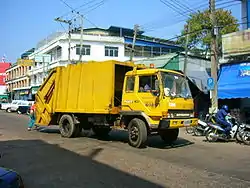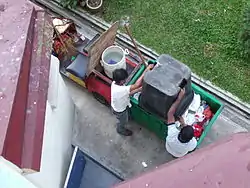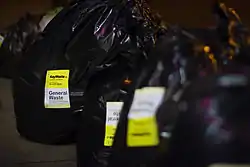Waste collection
Waste collection is a part of the process of waste management. It is the transfer of solid waste from the point of use and disposal to the point of treatment or landfill. Waste collection also includes the curbside collection of recyclable materials that technically are not waste, as part of a municipal landfill diversion program.

.jpg.webp)

Household waste
Household waste in economically developed countries will generally be left in waste containers or recycling bins prior to collection by a waste collector using a waste collection vehicle. Waste collection barges are used in some towns, for example in Venice, Italy.
However, in many developing countries, such as Mexico[1] and Egypt,[2] waste left in bins or bags at the side of the road will not be removed unless residents interact with the waste collectors.
Mexico City residents must haul their trash to a waste collection vehicle which makes frequent stops around each neighborhood. The waste collectors will indicate their readiness by ringing a distinctive bell and possibly shouting. Residents line up and hand their trash container to the waste collector. A tip may be expected in some neighborhoods.[1] Private contracted waste collectors may circulate in the same neighborhoods as many as five times per day, pushing a cart with a waste container, ringing a bell and shouting to announce their presence. These private contractors are not paid a salary, and survive only on the tips they receive.[1] Later, they meet up with a waste collection vehicle to deposit their accumulated waste.
The waste collection vehicle will often take the waste to a transfer station where it will be loaded up into a larger vehicle and sent to either a landfill or alternative waste treatment facility.
Safety and price considerations
Waste collection considerations of waste during different types of waste and size of bins, positioning of the bins, and how often bins are to be serviced. Overfilled bins result in rubbish falling out while being tipped. Hazardous rubbish like empty petrol cans can cause fires igniting other trash when the truck compactor is operating. Bins may be locked or stored in secure areas to avoid having non-paying parties placing rubbish in the bin.[3] The cost of old waste is also a concern in collection of waste across the globe.[4][5]
If waste collection is not carried out properly, it can lead to environmental pollution. This includes the breeding of animals and insects, and can eventually lead to the spread of disease. Usually waste is burned, however this leads to a bigger problem when it comes to air pollution. This can eventually create health issues to people in the surrounding areas.[6]
Employment as garbage collector
According to USNews,
The Bureau of Labor Statistics predicts that employment in this industry will increase 16.2 percent, adding 21,600 new jobs, by 2022. The main drivers of this growth include a rise in population, individual income and more people choosing to recycle.[7]
See also
- History of waste management
- Automated vacuum collection
- Beach cleaner
- Dempster Brothers (manufacturer of Dempster Dinosaur and Dempster Dumpmaster waste collection vehicles)
- List of waste management acronyms
- Sanitation worker
- Waste bin
- Waste sorting
References
- "MSN - Outlook, Office, Skype, Bing, Breaking News, and Latest Videos". NBC News. 25 January 2009.
- "Inter Press Service - News and Views from the Global South". ipsnews.net.
- "Waste Management FAQ". 2009.
- Waste Management Problems in Kerala
- "Red Kite Waste". Sunday, 4 April 2021
- Dugdhe, Saurabh; Shelar, Pooja; Jire, Sajuli; Apte, Anuja (January 2016). "Efficient waste collection system". 2016 International Conference on Internet of Things and Applications (IOTA). pp. 143–147. doi:10.1109/IOTA.2016.7562711. ISBN 978-1-5090-0044-9. S2CID 18176656.
- "Garbage Collector Ranks Among Best Jobs of 2018". money.usnews.com.


